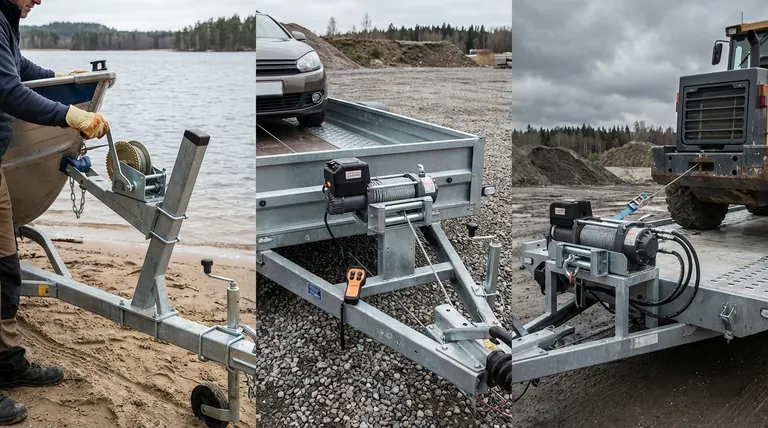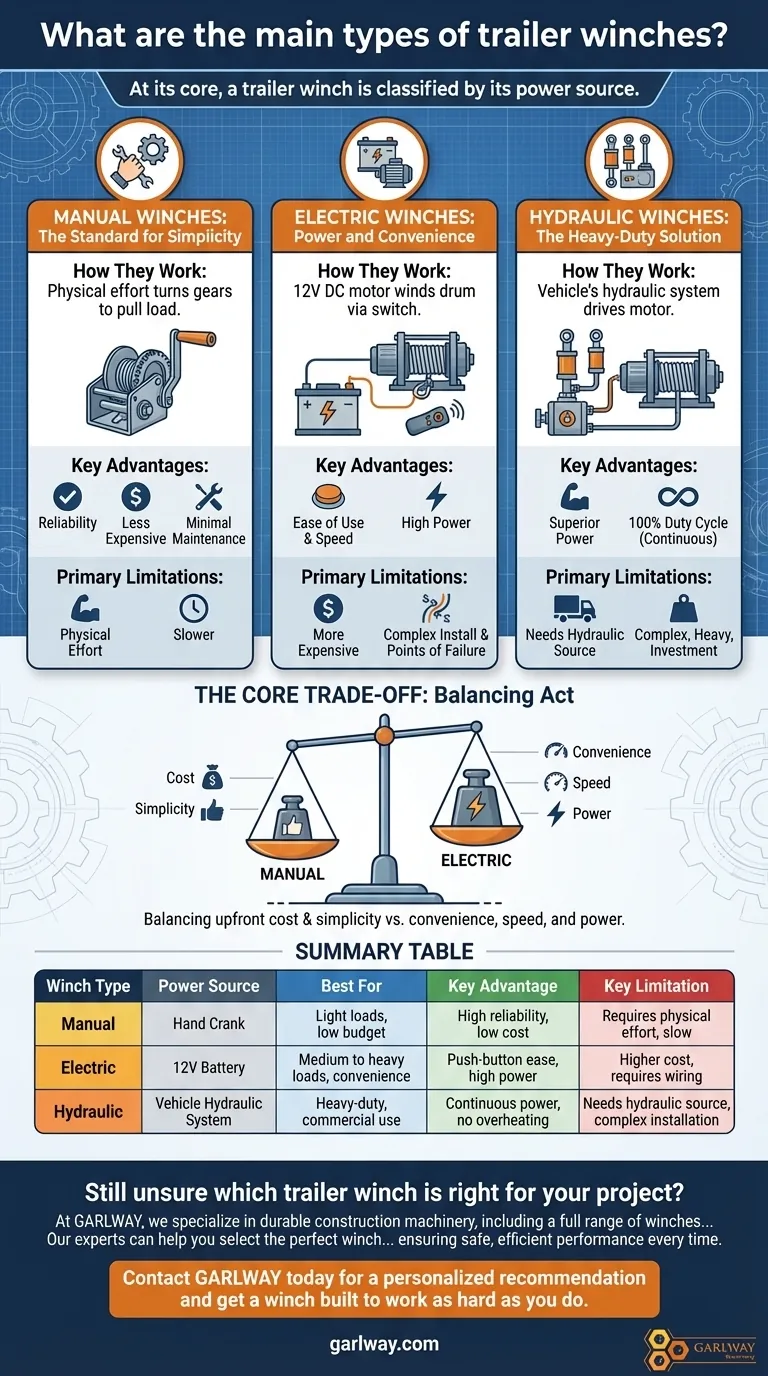At its core, a trailer winch is classified by its power source. The two primary types you will encounter are manual winches, which are operated by physical force using a hand crank, and electric winches, which use a motor powered by a 12-volt source like your vehicle's battery. A third, less common category for heavy-duty applications is the hydraulic winch.
The fundamental choice between trailer winch types is a direct trade-off. You are balancing the upfront cost and simplicity of a manual winch against the convenience, speed, and power of an electric winch.

Manual Winches: The Standard for Simplicity
A manual winch is the most straightforward type of winch. It relies entirely on your physical effort to operate a hand crank, which turns a set of gears to pull the attached cable or strap and, with it, your load.
How They Work
The mechanism is simple: turning the crank engages a gear system. This gear reduction provides a mechanical advantage, allowing you to pull a load much heavier than you could manage on your own.
Key Advantages
The primary benefit of a manual winch is its reliability. With no motors, wiring, or batteries to fail, it works anytime, anywhere. They are also significantly less expensive and require minimal maintenance.
Primary Limitations
The obvious drawback is the physical effort required, especially with heavier loads. They are also much slower to operate than powered winches, which can be a factor when you are short on time.
Electric Winches: Power and Convenience
Electric winches have become the most common type for a reason. They automate the pulling process, using a 12-volt DC motor to do the work for you at the push of a button.
How They Work
An electric winch is wired directly to a power source, typically the trailer's or tow vehicle's battery. A switch or remote control activates the motor, which winds the winch drum to pull the load.
Key Advantages
The main advantages are ease of use and speed. An electric winch can load a heavy boat or vehicle in a fraction of the time and with none of the physical strain of a manual model. They also offer much higher pulling capacities.
Primary Limitations
Their convenience comes with complexity. Electric winches are more expensive and require proper installation and wiring. They also introduce more potential points of failure, such as the motor, solenoid, wiring, or the power source itself.
Hydraulic Winches: The Heavy-Duty Solution
While less common on consumer trailers, hydraulic winches are a critical third type used in commercial and industrial applications.
How They Work
These winches tap into a vehicle's existing hydraulic system, typically powered by the power steering pump. Hydraulic fluid under pressure drives a motor to provide immense and continuous pulling power.
Key Advantages
Hydraulic winches offer superior pulling power and a 100% duty cycle, meaning they can run continuously without overheating, unlike many electric motors. This makes them ideal for constant, heavy-use scenarios like tow trucks or heavy equipment trailers.
Primary Limitations
The main barrier is the prerequisite of a hydraulic power source, which most standard trucks and SUVs lack. They are complex, heavy, and represent a significant investment compared to other types.
Understanding the Core Trade-offs
Choosing the right winch means understanding the balance between three key factors. There is no single "best" type; there is only the best type for your specific needs.
Cost vs. Convenience
This is the most significant trade-off. Manual winches offer the lowest upfront cost but demand your time and physical energy. Electric winches cost more but provide push-button convenience that saves effort and time.
Power vs. Simplicity
If you are moving light loads like a small aluminum boat or a jet ski, the simplicity of a manual winch is often sufficient and more reliable. For heavier loads like larger boats or cars, the power of an electric winch becomes a near necessity.
Installation and Maintenance
A manual winch is a self-contained unit that simply bolts onto the trailer tongue. An electric winch requires running power cables, mounting solenoids, and ensuring your vehicle's electrical system can handle the load.
Making the Right Choice for Your Task
Your final decision should be guided by the weight of your load and your personal priorities.
- If your primary focus is low cost and reliability for light loads: A manual winch is the most practical and economical choice.
- If your primary focus is convenience and power for medium-to-heavy loads: An electric winch is the industry standard and the best all-around option.
- If your primary focus is extreme power for continuous, commercial use: A hydraulic winch is the only option that meets these professional-grade demands.
Ultimately, matching the winch's capability to your specific task ensures safe, efficient, and stress-free loading.
Summary Table:
| Winch Type | Power Source | Best For | Key Advantage | Key Limitation |
|---|---|---|---|---|
| Manual | Hand Crank | Light loads, low budget | High reliability, low cost | Requires physical effort, slow |
| Electric | 12V Battery | Medium to heavy loads, convenience | Push-button ease, high power | Higher cost, requires wiring |
| Hydraulic | Vehicle Hydraulic System | Heavy-duty, commercial use | Continuous power, no overheating | Needs hydraulic source, complex installation |
Still unsure which trailer winch is right for your project?
At GARLWAY, we specialize in durable construction machinery, including a full range of winches, concrete mixers, and batching plants designed for construction companies and contractors worldwide. Our experts can help you select the perfect winch to match your load capacity, budget, and operational needs—ensuring safe, efficient performance every time.
Contact GARLWAY today for a personalized recommendation and get a winch built to work as hard as you do.
Visual Guide

Related Products
- Ready Mixer Machine for Construction Ready Mix Machinery
- Commercial Construction Mixer Machine for Soil Cement Mixing Concrete
- Small Electric Winch 120V and 240V for Compact Applications
- Electric and Hydraulic Winch for Heavy Duty Applications
- 12000 lb Heavy Duty Electric Boat Winch
People Also Ask
- What safety measures should be taken when using an electric winch? A Guide to Accident-Free Lifting
- What are the environmental benefits of using electric winches? Reduce On-Site Pollution & Boost Efficiency
- What are the benefits of using a winch for mud extrication? Achieve Safe, Efficient Vehicle Recovery
- What is the primary function of a hoist in industrial applications? Lift, Lower, and Transport Heavy Loads Efficiently
- What is the first safety measure recommended before operating an electric winch? A Guide to Safe and Effective Operation
- What are the main benefits of electric winches compared to hydraulic ones? Discover Simpler, More Cost-Effective Lifting
- What are the key components of an electric winch? A Guide to Its Powerful Inner Workings
- What is required for sliding winches to function? The Essential Track System for Flexible Cargo Control



















